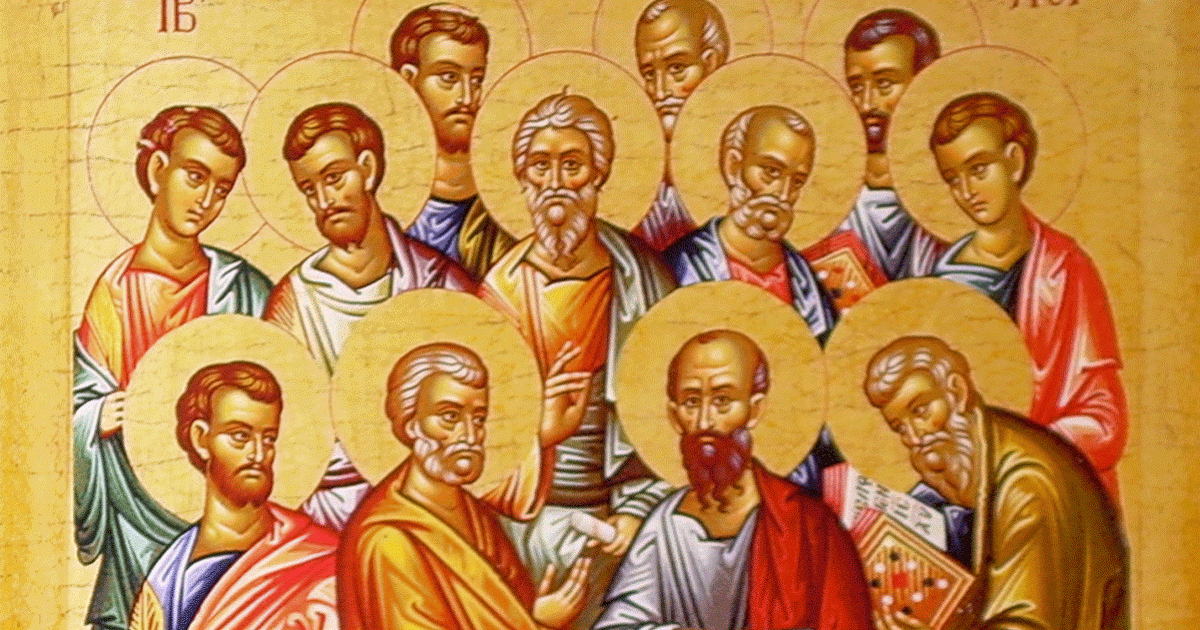If to others I am not an apostle, at least I am to you; for you are the seal of my apostleship in the Lord. This is my defense to those who would examine me. Do we not have the right to our food and drink? Do we not have the right to be accompanied by a wife, as the other apostles and the brothers of the Lord and Cephas? Or is it only Barnabas and I who have no right to refrain from working for a living? Who serves as a soldier at his own expense? Who plants a vineyard without eating any of its fruit? Who tends a flock without getting some of the milk? Do I say this on human authority? Does not the law say the same? For it is written in the law of Moses, “You shall not muzzle an ox when it is treading out the grain.” Is it for oxen that God is concerned? Does he not speak entirely for our sake? It was written for our sake, because the plowman should plow in hope and the thresher thresh in hope of a share in the crop. If we have sown spiritual good among you, is it too much if we reap your material benefits? If others share this rightful claim upon you, do not we still more? Nevertheless, we have not made use of this right, but we endure anything rather than put an obstacle in the way of the gospel of Christ.
I Corinthians 9:2-12 (Epistle from the Eleventh Sunday)
We don’t always know the context that was happening when St. Paul wrote his Epistles to the early churches. There were controversies in the early churches, same as there are in modern-day churches, and probably the same controversies. There is probably always someone in every church who thinks the pastor or priest makes too much money. As a priest, I agree with St. Paul, that this is not only a calling, but a vocation and people in it should be able to make a living from it. Furthermore, priests need from the people, the same things that they give to the people. I enjoy praying for people. I need people to pray for me. I enjoy giving encouragement to others. I need encouragement from others as well.
While there are different positions in the church—there is a priest, a chanter, choir director, Sunday School teachers, altar boys, ushers, parish council members, committee members, etc.—each should be working for the same goal, salvation, and each should be rooting for the others and helping this come about by helping and encouraging it. As St. Paul says, both the plowman and the thresher should work in their respective roles with the hope to share in the same crop. Neither is more important than the other. Both roles are necessary in order to gather a crop.
The final verse of this Epistle lesson is important because it reminds us to stay focused on the highest goal, advancing the Gospel of Jesus Christ. It actually warns us not to put obstacles in the way of the Gospel of Christ. If we are doing something, even something we think is righteous, if we are putting an obstacle in the way of the Gospel, then we are doing something wrong. If I’m doing something that causes you to go away from the Gospel, I am doing something wrong.
The highest goal in life is supposed to be the attainment of salvation. Therefore the greatest work in life is to help further the message of salvation. This is not only the work of the priest but the work of everyone. For instance, who is going to be more effective teaching a child about the faith—a priest whom that child sees for an hour on Sunday, or a parent whom the child sees every day? The priest certainly helps to teach and encourage the faith but is not the number one source when it comes to teaching a child the faith.
People come to Christ not by what we say, but by what we do. When people have obstacles thrown in their path, they have a harder time coming to Christ. When people see others throwing obstacles in their path, they are more likely to become discouraged, even angry and cynical. When people see others removing obstacles, they become inspired and encouraged. And when you help remove an obstacle from someone else’s way, this is how they come to Christ and get engaged in Christianity.
One obstacle that comes into everyone’s path is sadness. If a person is sick or suffers a loss, they have sadness in their path. If we minister to them in their sadness, we help remove that obstacle. If, however, we are the one who adds sadness to their path, we become an obstacle for them. God most certainly will judge us based on whether we were obstacle creators or obstacle movers.
The Angel standing at the sepulcher cried out and said to the ointment-bearing women: The ointments are appropriate for mortal men, but Christ has been shown to be a stranger to decay. So go and cry aloud, The Lord has risen and granted the world His great mercy. (Second Resurrectional Kathisma of the first set, Second Tone, Trans. by Fr. Seraphim Dedes)
Be an obstacle mover today, so that everyone in your path, whatever role they play in your life, or life in general, can move further along in their journey to salvation!

0 Comments